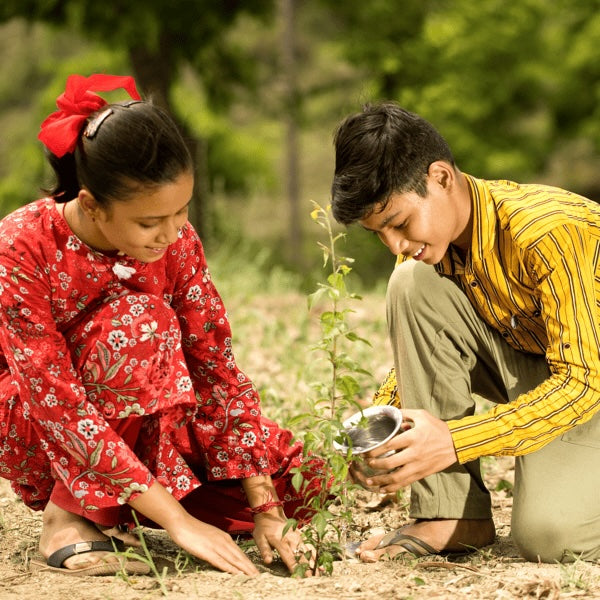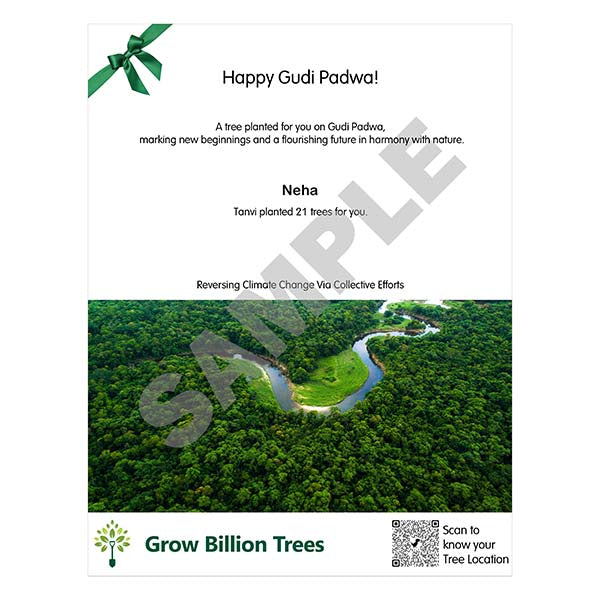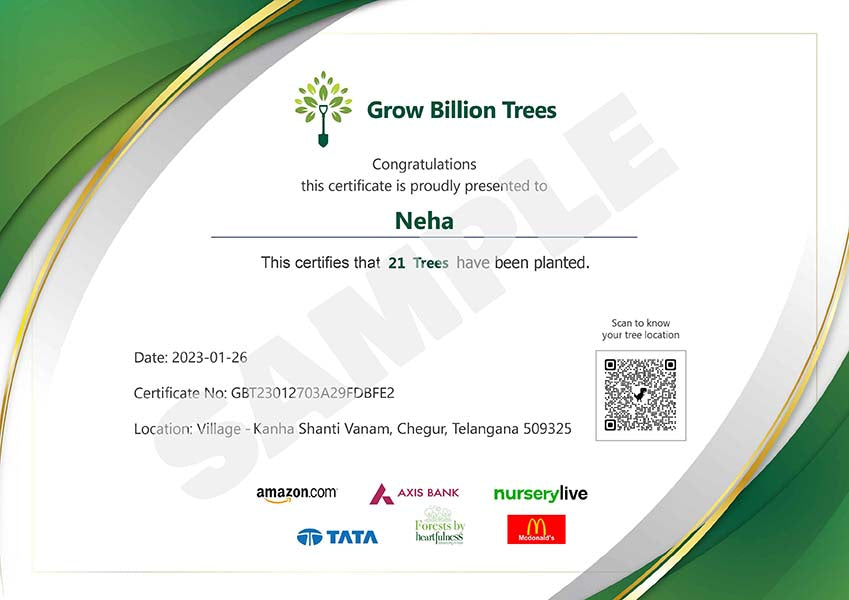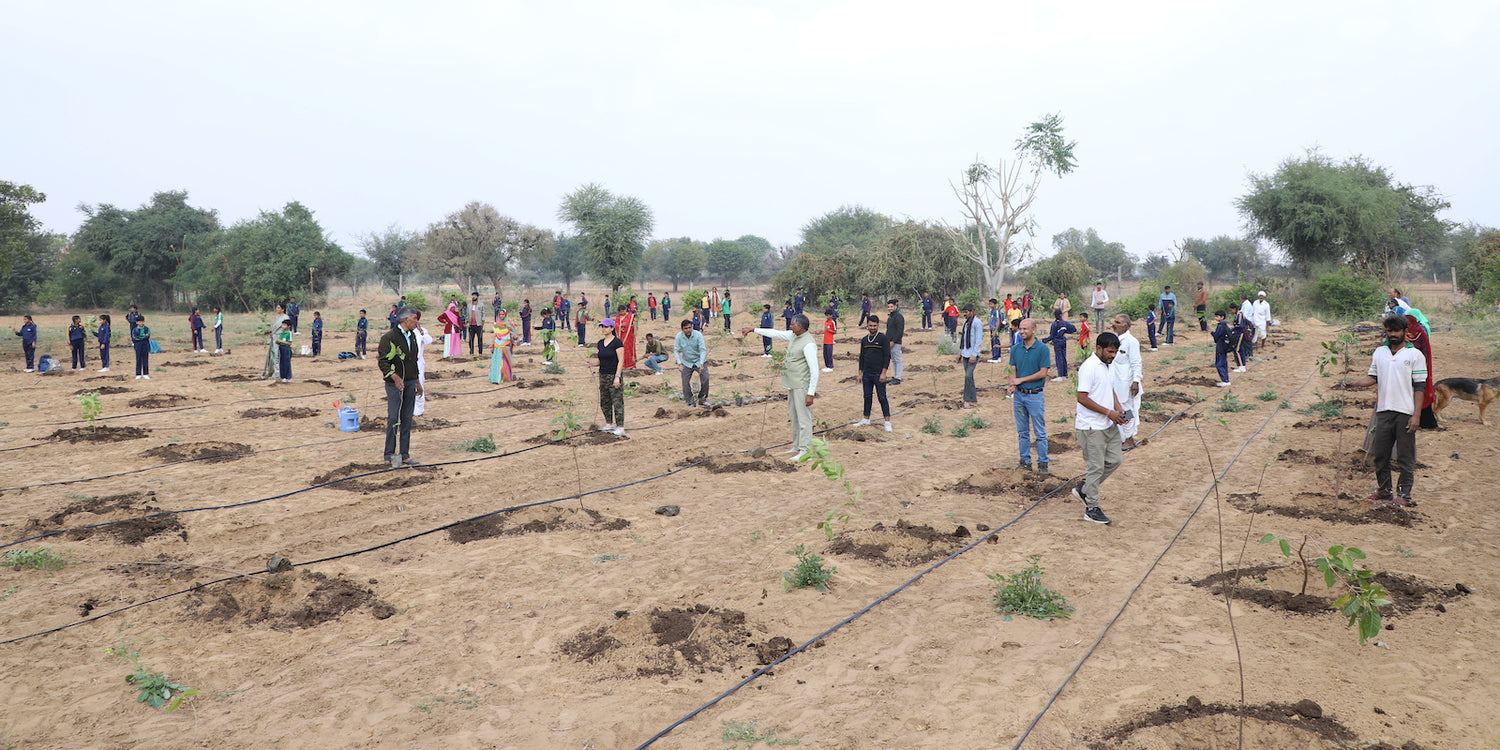Trees for Gudi Padwa
Trees for Gudi Padwa
🌳 2-3ft Tree + 3 Years Nurturing + Geo-Tagged
💡 Tip: 21 Trees for new beginnings & growth
51 Trees to nurtures family in both spiritual & physical aspects
Couldn't load pickup availability
What you get ?
Tree(s) Plantation
Tree(s) Plantation
A tree(s) native to the region will be planted within 7 -10 days, and post-plantation monitoring will be thoroughly managed.
*You will receive an email/whatsapp notification immediately after the tree(s) plantation. or you can check the current status by logging into "My Account" anytime.
e-Greeting Card of Tree(s) Plantation for Gifting
e-Greeting Card of Tree(s) Plantation for Gifting
If you want to gift these tree(s) to your loved ones, You can generate an e-Greeting card for tree(s) plantation by logging into "My Account" after placing order.
*Please generate it within 5 days of placing the order.
e-Certificate of Tree(s) Plantation
e-Certificate of Tree(s) Plantation
A e-certificate of Tree(s) Plantation with the project details will be issued in your name after tree(s) plantation.
*You can download it from "My Account".
Geotag of your Tree(s)
Geotag of your Tree(s)
You can immediately track the live location of the project chosen for your tree(s) plantation, by logging into "My Account" or, by scanning the QR code on the certificate.
*You can see Your Name in respective Project/Forest.
If you want to gift these tree(s) to your loved ones, You can generate an e-Greeting card for tree(s) plantation by logging into "My Account" after placing order.
View full details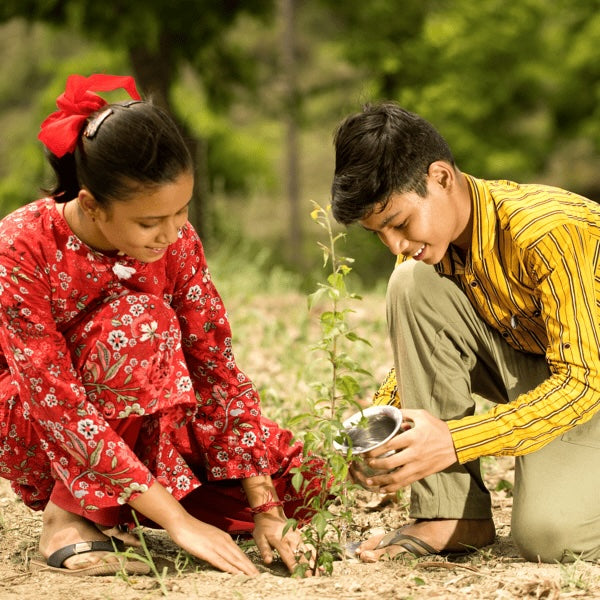
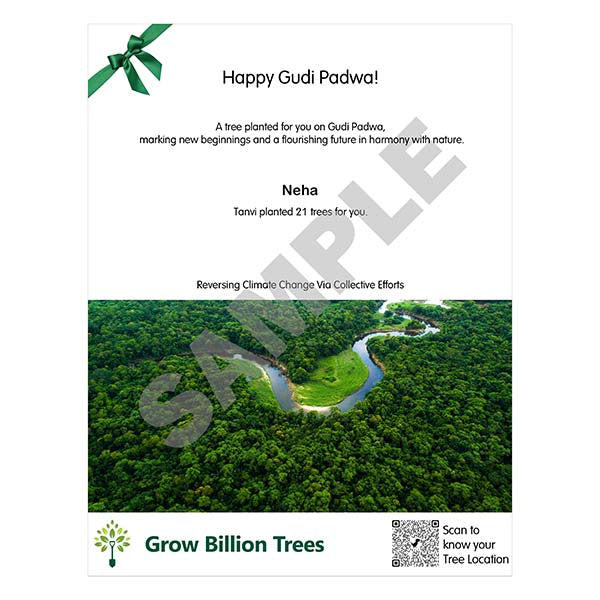
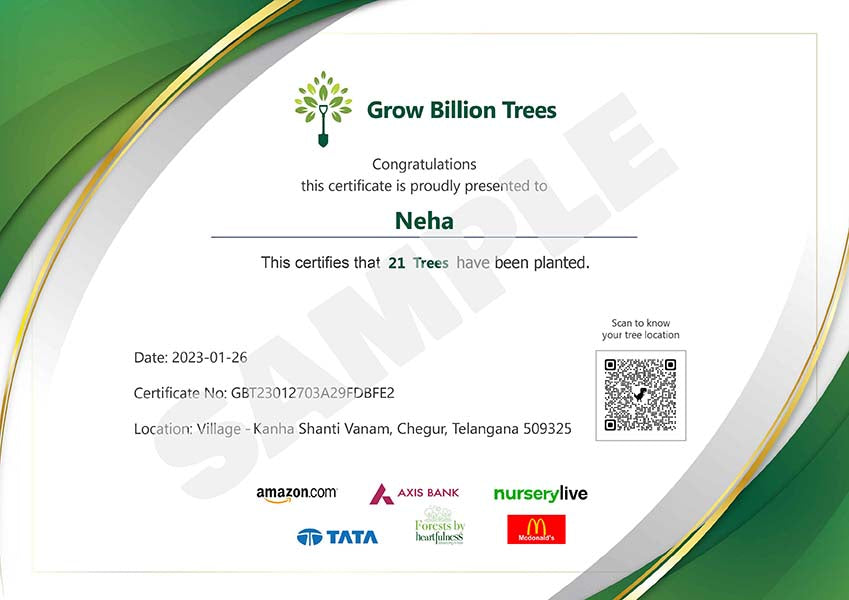
Tree plantation is a great way to celebrate Gudi Padwa, the Hindu New Year celebrated in Maharashtra and other parts of India. Planting Read more
Trending
Celebrate Gudi Padwa with Eco-Friendly Tree Plantation
Description:
Tree plantation is a great way to celebrate Gudi Padwa, the Hindu New Year celebrated in Maharashtra and other parts of India.
Planting trees not only helps to make the environment cleaner and healthier but also serves as a symbolic act of new beginnings and growth.
Gudi Padwa is a festival that celebrates the beauty and power of nature. It is a reminder of our connection to the environment and the importance of living in harmony with it.
Scope:
- Enhancement of Biodiversity
- Increase in Green Cover
- Reduction of Man-Animal Conflict
- Generation of Rural Employment
- Improvement of Wildlife Habitats
Tree Species:
The species of trees that are planted depend on the project, and they are chosen based on their native habitat in the corresponding ecological zone.
Why trees?
The festival is celebrated during the spring season, which is a time of new growth and renewal in nature. In fact, many of the customs and rituals associated with Gudi Padwa are linked to nature and agriculture.
Here are some examples of how Gudi Padwa is connected to nature:
-
Planting trees: Planting trees is a common practice during Gudi Padwa. This is because trees are an important part of the ecosystem and help to purify the air and provide shade and shelter to humans and animals.
-
Decorating with flowers and mango leaves: On Gudi Padwa, people decorate their homes with flowers and mango leaves. This is not only aesthetically pleasing but also has a practical purpose. The flowers and mango leaves help to purify the air and keep the home cool during the hot summer months.
-
Harvest festival: Gudi Padwa is also celebrated as a harvest festival, which is a time when farmers reap the fruits of their labor. It is a reminder of the importance of agriculture and the interdependence between humans and nature.
-
Symbolism: The Gudi flag, which is hoisted on Gudi Padwa, is made of a bamboo stick, which represents nature, and a cloth, which represents the human spirit. This symbolizes the importance of living in harmony with nature and respecting its power and beauty.
Gudi Padwa
Gudi Padwa is a spring festival celebrated by Hindus in the Indian state of Maharashtra, which marks the beginning of the New Year and the harvest season.
Tree Plantation
Tree plantation refers to the process of planting new trees in an area to increase the green cover and combat deforestation.
Environment
The environment refers to the natural surroundings in which we live, including air, water, soil, and all living organisms.
Sustainability
Sustainability refers to the ability to maintain and preserve natural resources for future generations.
Biodiversity
Biodiversity refers to the variety of living organisms in a given area or ecosystem.
Afforestation
Afforestation is the process of establishing a forest or stand of trees in an area where there was no forest.
Carbon footprint
Carbon footprint refers to the amount of carbon dioxide and other greenhouse gases emitted by an individual, organization, or activity.
Climate change
Climate change refers to the long-term alterations in the Earth's climate, including rising temperatures and changes in precipitation patterns, that are largely driven by human activity.
Greenhouse gases
Greenhouse gases are gases that trap heat in the Earth's atmosphere, contributing to climate change. Carbon dioxide is the most well-known greenhouse gas, but others include methane, nitrous oxide, and fluorinated gases.
Ecological restoration
Ecological restoration refers to the process of repairing and rehabilitating damaged or degraded ecosystems.
Ecosystem services
Ecosystem services are the benefits that humans derive from natural ecosystems, such as clean air and water, pollination of crops, and recreation opportunities.
Forest conservation
Forest conservation refers to the protection and management of forested areas to ensure their ecological, economic, and social benefits are maintained.
Green initiatives
Green initiatives are actions taken to promote environmental sustainability, such as recycling programs, energy-efficient buildings, and public transportation systems.
Wildlife conservation
Wildlife conservation refers to the protection and management of wild animals and their habitats to ensure their survival.
Sustainable development
Sustainable development refers to the practice of meeting the needs of the present generation without compromising the ability of future generations to meet their own needs, while also preserving the natural resources and biodiversity of the planet.
Most Popular
Impact of your Tree
-
Releases Oxygen
A mature tree produces around 120 kilograms of oxygen per year, which is sufficient for one human per year.
-
Reduces Air Pollution
A tree absorbs harmful gases like CO2, NO2 released by factories and vehicles, which can have serious health problems for us
-
Removes CO2
A Tree removes 22 KGs of CO2 from atmosphere per year, which is equivalent to the CO2 realeased by a human in 10 days.
-
Cooling Effect
A Tree generates cooling effect of around 10 room size ACs by providing shade and through a process of transpiration.
Special Plantations
FAQ
"What is Gudi Padwa?
Gudi Padwais a New Year's Day celebration that marks the beginning of a new year in the Hindu calendar, which is followed in the southern states of India, including Maharastra, Goa and Konkan Region. Ugadi is celebrated with various rituals and festivities, including the preparation of traditional food and the exchange of gifts. Ugadi is considered a time of renewal and new beginnings, and is celebrated with great enthusiasm and joy by the local communities."
Why is Gudi Padwa Celebrated ?
Gudi Padwais celebrated for various reasons. Firstly, it marks the beginning of a new year in the Hindu calendar, and is therefore considered an auspicious time for new beginnings and fresh starts. Secondly, it is believed that on this day, Lord Brahma, the creator of the universe, created the world, and therefore Ugadi is also considered a time of creation and renewal. Additionally, Gudi Padwa is associated with the spring season, which symbolizes growth, prosperity, and abundance. Finally, Gudi Padwais celebrated with various rituals and customs that are meant to bring good luck, prosperity, and happiness to the households and communities that celebrate it.
Why is tree plantation important for Ugadi?
Tree plantation is considered an auspicious activity during Ugadi, as it symbolizes new beginnings and growth.
What is the significance of planting trees on the occasion of Gudi Padwa?
A: Planting trees on Gudi Padwa is a symbolic act of new beginnings and growth, and it also helps to make the environment cleaner and healthier.
What is the best time to plant trees on Gudi Padwa?
A: The best time to plant trees on Gudi Padwa is during the spring season, when the weather is mild and conducive to the growth of young trees.
How many trees should one plant on Gudi Padwa?
A: There is no fixed number of trees that one should plant on Gudi Padwa. It depends on the available space and resources, as well as the individual's ability to take care of the trees.
What types of trees are suitable for planting on Gudi Padwa?
A: The type of trees that are suitable for planting on Gudi Padwa depends on the local climate and soil conditions. It is best to consult with local horticulturists or tree experts to determine the best species to plant.
Can one plant trees in pots or containers on Gudi Padwa?
A: Yes, one can plant trees in pots or containers on Gudi Padwa, especially if they have limited space or live in urban areas.
How often should one water the trees planted on Gudi Padwa?
A: The frequency of watering depends on the species of tree and the local climate conditions. It is best to consult with local horticulturists or tree experts to determine the best watering schedule.
How can one take care of the trees planted on Gudi Padwa?
A: Taking care of the trees involves regular watering, fertilization, pruning, and pest control measures. It is also important to monitor the health of the trees and take corrective action as needed.
What are the benefits of planting trees on Gudi Padwa?
A: Planting trees on Gudi Padwa helps to improve the air quality, prevent soil erosion, provide shade and shelter to humans and animals, and contribute to the overall health of the environment.
Can children participate in tree planting on Gudi Padwa?
A: Yes, children can participate in tree planting on Gudi Padwa, and it is a great way to teach them about the importance of caring for the environment.
Can planting trees on Gudi Padwa be done in groups or communities?
A: Yes, planting trees on Gudi Padwa can be done in groups or communities, and it is a great way to bring people together for a common cause.
Is there any cultural significance to planting trees on Gudi Padwa?
A: Yes, planting trees on Gudi Padwa has cultural significance, as it is seen as an act of worship and devotion to the environment and nature.
Is there any spiritual significance to planting trees on Gudi Padwa?
A: Yes, planting trees on Gudi Padwa is believed to bring blessings and prosperity to the household and is seen as a way to connect with the divine.
How can one ensure that the trees planted on Gudi Padwa survive and thrive?
A: To ensure that the trees planted on Gudi Padwa survive and thrive, it is important to choose the right species, plant them in the right location, and take care of them regularly.
How can we raise awareness about the importance of tree plantation during Ugadi?
Awareness about the importance of tree plantation during Ugadi can be raised by conducting awareness campaigns, organizing tree plantation drives, involving the local media, and educating school children.
Can planting trees help support local wildlife?
Yes, planting trees can help support local wildlife by providing habitats and food sources for birds, insects, and other animals.
How does deforestation impact the environment?
Deforestation can lead to soil erosion, loss of habitat for wildlife, increased carbon emissions, and other environmental problems.
What can individuals do to help promote environmental conservation?
Individuals can promote environmental conservation by reducing their carbon footprint, using renewable energy sources, recycling, and supporting initiatives like Trees for Heartfulness.

